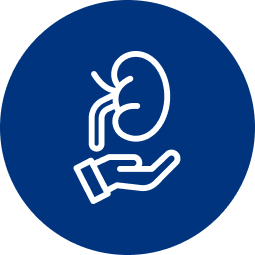Best Kidney Transplant Hospital in Indore
Kidneys are relatively adaptable organs; most individuals can operate efficiently with only 15% of their kidneys functioning. Filtering waste from the blood and eliminating it from the body through urine is the function of the kidneys. A person with damaged or diseased kidneys cannot adequately carry out this function. The consistent proportions of waste materials in the circulation grow, resulting in us becoming sick. A kidney transplant, or a renal transplant, is a surgical procedure meant to replace an infected or malfunctioning kidney from a patient with end-stage renal disease with a healthy kidney obtained from a compatible donor. The life-saving process of kidney transplantation has saved many people's lives with end-stage kidney disease.
One of the most common transplant procedures is a kidney transplant, and at CARE CHL Hospitals Indore, our team of experts offers cutting-edge techniques and approaches for this treatment. We emphasise the diagnosis, management, and treatment of kidney conditions as well as kidney transplants. We provide a dedicated transplant unit as well as ICUs that are fully equipped with the latest technology and equipment.
Conditions that may require a Kidney Transplant
Kidney failure can result from a variety of ailments and conditions. The following are the most common causes of renal failure:
- Type 2 Diabetes - Excess sugar in the bloodstream damages millions of tiny blood-filtering units inside the kidneys, eventually leading to kidney damage.
- High blood pressure - Prolonged high blood pressure can cause the arteries near the kidneys to harden, narrow, or weaken. The damaged blood vessels are then unable to supply sufficient oxygen and nutrients to the kidney tissues, resulting in kidney failure.
- Polycystic kidney disease - This hereditary condition leads to the growth of cysts, or clusters of fluid-filled sacs, within the kidneys, impairing their ability to filter blood effectively.
- Glomerulonephritis - The kidneys contain minuscule filters known as glomeruli, which remove waste, electrolytes, and excess fluid from the blood. Inflammation of these filters, referred to as glomerulonephritis, can occur.
- Serious urinary tract defects - These conditions, which may be hereditary or congenital, obstruct normal kidney function and ultimately give rise to kidney failure.
Types of Kidney Transplant Services offered at CARE CHL hospitals, Indore
- Living Related Donors - First-degree relatives, such as brothers, sisters, parents, or children, are considered. People generally possess two kidneys, but they can function normally with just one, making this method of transplantation feasible. Opting for an immediate relative is preferable due to the higher likelihood of tissue matching.
- Living Unrelated Donors - This category encompasses the patient's uncles, aunts, cousins, nieces, nephews, and other relatives who may be connected to them through the patient's maternal or paternal lineage.
- Deceased Donors - These donors are individuals without kidney problems, infections, or malignancies, and who are determined to be brain stem dead. Among the most suitable candidates are donors who have experienced a car accident, a stroke, or a brain tumour.
Before the procedure of the Kidney Transplant
Whether living or deceased, and whether related or unrelated to the patient, kidney donors might fall into any of the three categories. If a donor kidney is considered a suitable match for the patient, the transplant team will take several variables into account. The following tests may be conducted to determine the viability of a kidney donation:
- Blood typing
- Tissue typing
- Crossmatch
During a kidney transplant, general anaesthesia is employed. This involves administering a medication to the patient before the surgery, inducing a state of sleep.
What happens during a Kidney Transplant?
During a kidney transplant procedure, a healthy kidney is implanted into the body to take over the functions that a failing kidney can no longer perform. Depending on the placement within the abdomen, the replacement kidney is surgically connected to surrounding blood arteries. The kidney readily connects to these blood arteries and the bladder in its new position. Both the vein and artery of the new kidney are linked. Additionally, the ureter of the new kidney is connected to the bladder, allowing urine to be eliminated from the body.
What happens following a Kidney Transplant?
After a kidney transplant, most patients stay in the hospital for around three to four days. This stay enables the medical staff to carefully monitor the patient and ensure that they are experiencing a full recovery. The newly transplanted kidney could begin functioning immediately. Alternatively, individuals may require temporary dialysis until the kidney starts functioning. This phase might last for a few days or even weeks. To prevent the immune system from rejecting the newly transplanted kidney, the patient will also need to initiate a regimen of medications.
It is important to prioritise relaxation and recuperation following the transplant procedure. Within eight weeks of the transplant, the majority of patients are able to resume normal daily activities. To verify proper kidney function, doctors may recommend routine testing.
Benefits of Kidney Transplant
The primary benefit of kidney transplantation is an improved quality of life. With sufficient time for daily tasks, patients can practically lead a normal life. There is a high probability that individuals will survive another 5 to 10 years following the transplant. Since the patient now has one functioning kidney, life continues as usual, and therefore, the unavoidable dietary restrictions associated with dialysis still apply. Patients who have undergone kidney transplants report feeling healthier and having more overall energy than they did during the months and years when they experienced issues with their natural kidneys.
Risks Associated with Kidney Transplant
A kidney transplant is a significant surgery, and like any major surgical procedure,it's important to be aware of certain risk factors to ensure the best possible outcome, such as:
- Side effects of general anaesthesia
- Formation of blood clots
- Blockage or leaks in the ureters
- Internal bleeding
- Kidney failure after donation
- Organ rejection following donation
- Infection
- Heart attacks and strokes
Why is it Recommended?
Compared to a lifetime of dialysis, a kidney transplant can emerge as the preferred treatment for kidney failure. Chronic kidney disease or end-stage renal disease can be effectively treated with a kidney transplant, significantly improving the patient's health and overall lifespan. In contrast to dialysis, a kidney transplant is associated with:
- An improved quality of life.
- A reduced mortality rate.
- Fewer stringent dietary requirements.
- Lower treatment costs.
Achievements CARE CHL Hospital Made
Over the years, several achievements and milestones have been created by the Kidney Transplant program at CARE CHL Hospital, Indore:
- First in Madhya Pradesh: CARE CHL was the first in the state to perform both liver and heart transplants. As of September 2017, the transplant center had successfully conducted 9 living-donor kidney transplants and 10 cadaveric (deceased-donor) kidney transplants.
- Actively participates in “green corridor” operations to ensure the swift transportation of organs. In November 2024, the hospital enabled the 58th green corridor in Indore, saving the lives of two individuals.
CARE CHL Hospitals Indore is a renowned and reputable organ transplant centre located in Indore. We boast a dedicated kidney transplant unit equipped with cutting-edge technology, proficient medical professionals, and an unparalleled workforce. The hospital prioritises the well-being of its patients, ensuring top-notch post-transplant healthcare. Our team of highly qualified doctors and nurses is committed to delivering the best possible results for our patients, making us the best kidney transplant hospital in Indore. CARE CHL Hospitals offers the finest kidney transplant treatments at a reasonable price, dedicated to saving lives.



